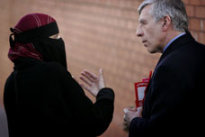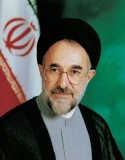The government is facing a major split over race hate laws, with cabinet colleagues divided over whether the legislation should be toughened.
Two cabinet heavyweights – the Chancellor, Gordon Brown, and the Home Secretary, John Reid – differ over how to respond to Friday’s acquittal of the British National Party leader, Nick Griffin, and a fellow BNP activist.
The split comes as Brown, Reid and the Tory leader David Cameron all made moves yesterday to boost their credentials over anti-terror measures and law and order ahead of the Queen’s Speech on Wednesday. The speech will include sweeping new measures to tackle antisocial behaviour, immigration, reoffending and terrorism.
Brown responded to the BNP verdict by saying Griffin’s description of Islam as a “wicked, vicious faith” would offend “mainstream opinion in this country”. He said: “If there is something that needs to be done to look at the law, then I think we will have to do that.”
But Home Office sources said Reid was taking a more cautious line, ruling out new legislation until well into next year. They said he wanted to see how a new race and religious hatred law – watered down by amendments in the House of Lords – “bedded in” when it came into force in February.
The Brown-Reid divide was seen as particularly significant because the Home Secretary is being mentioned by some Blair loyalists as a potential successor to the Prime Minister.
The Chancellor’s suggestion that the law might have to be tightened also prompted a strong reaction from the Liberal Democrat peer who helped lead the Lords’ opposition to last year’s bill.
Lord Lester, a leading human rights lawyer, said he and others would strongly oppose tougher legislation, and criticised the Attorney General, Lord Goldsmith, for bringing a prosecution against the BNP leader. “What we need is not new laws but a more sensible attorney-general,” he said.
Goldsmith is planning a meeting tomorrow with the Crown Prosecution Service lawyers who prosecuted Griffin and the other BNP member, Mark Collett. “He will examine whether prosecutors have sufficient powers to take the necessary action,” a spokeswoman in the Attorney General’s office said yesterday.
Last year’s bill, before it was diluted by the Lords amendments, would have allowed people to be prosecuted for using “threatening, insulting or abusive behaviour”. Under the final version only “threatening” behaviour is covered. The prosecution will also have to show intention to foment hatred rather than just recklessness.
Observer, 12 November 2006

 Commons leader Jack Straw has been the subject of a hard-hitting attack by former home secretary Charles Clarke for starting the national debate on the wearing of the full veil by Muslim women.
Commons leader Jack Straw has been the subject of a hard-hitting attack by former home secretary Charles Clarke for starting the national debate on the wearing of the full veil by Muslim women. Jack Straw’s comments on veils have been good news for the owner of The Hijab Centre in the MP’s constituency of Blackburn. Nadeem Siddiqui tells me he is selling more veils than he did before his local MP made his controversial remarks.
Jack Straw’s comments on veils have been good news for the owner of The Hijab Centre in the MP’s constituency of Blackburn. Nadeem Siddiqui tells me he is selling more veils than he did before his local MP made his controversial remarks. About a dozen protesters gathered outside Younger Hall, where the university principal, Brian Lang, presented the former president with his degree.
About a dozen protesters gathered outside Younger Hall, where the university principal, Brian Lang, presented the former president with his degree. A storm of protest is expected to greet a controversial Iranian former president in Scotland next week amid growing opposition to his visit.
A storm of protest is expected to greet a controversial Iranian former president in Scotland next week amid growing opposition to his visit. Britain and Australia are not the only countries where debate is raging over the Islamic veil. In Italy, the issue burst into the news this week after the interior ministry ordered round-the-clock police protection for an MP, believing she had been threatened for expressing her views on the subject.
Britain and Australia are not the only countries where debate is raging over the Islamic veil. In Italy, the issue burst into the news this week after the interior ministry ordered round-the-clock police protection for an MP, believing she had been threatened for expressing her views on the subject.